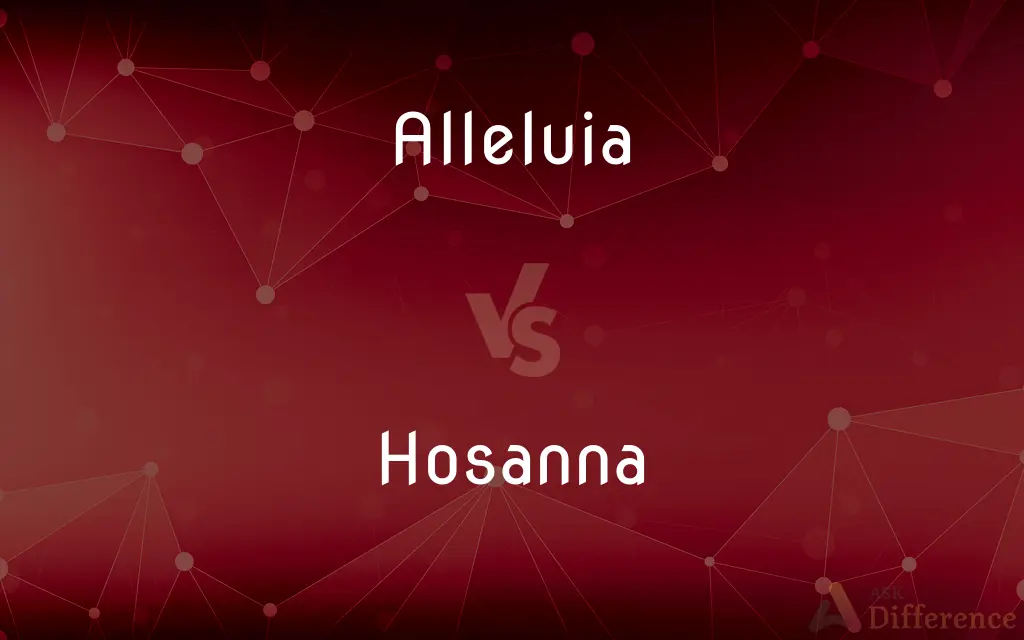Alleluia vs. Hosanna — What's the Difference?
By Fiza Rafique & Urooj Arif — Updated on April 3, 2024
Alleluia is an exclamation of praise or joy, often used in Christian worship to express rejoicing, especially for resurrection of Christ. Hosanna is plea for salvation, traditionally an appeal for divine help, now also used as a declaration of praise.

Difference Between Alleluia and Hosanna
Table of Contents
ADVERTISEMENT
Key Differences
Alleluia, also spelled "Hallelujah," originates from Hebrew, meaning "Praise the Lord." It is commonly used in Christian liturgies, particularly in the context of Easter to celebrate the resurrection of Jesus Christ. This term is emblematic of joy and triumph, often sung or proclaimed to express spiritual delight and the victory of faith. On the other hand, Hosanna, also deriving from Hebrew, originally meant "save, please" or "save us, we pray." It was used by the crowds welcoming Jesus into Jerusalem as a cry for deliverance, which over time has evolved in Christian tradition to become an expression of praise and adoration, maintaining a connotation of salvation and deliverance.
The use of Alleluia is widespread in Christian hymns, prayers, and liturgical music, symbolizing an eternal celebration of God's glory and grace. It underscores a believer's joy in the divine and is a declaration of the worshipper's faith in the ultimate triumph of God. Whereas Hosanna is used specifically in the context of Palm Sunday within many Christian denominations, marking Jesus's triumphant entry into Jerusalem. This shift from a plea for help to a shout of jubilation reflects the Christian belief in Jesus as the Messiah who brings salvation.
Alleluia serves as a liturgical refrain, particularly prominent in the celebration of the Eucharist and other sacraments. Its usage is especially pronounced during the Easter season, a period marked by reflection on the resurrection and the foundational joy of Christianity. In contrast, Hosanna is often associated with specific biblical narratives and is utilized in services commemorating these events, emphasizing the believers' plea for salvation through Christ.
While Alleluia is typically expressed as a general exultation without direct appeal to God's intervention in specific situations, Hosanna carries a dual nature. It is both an appeal for salvation, reflecting human dependency on divine mercy, and a recognition of divine kingship and sovereignty, celebrating the fulfillment of God's promises. This nuanced use of Hosanna embodies the complexity of the Christian faith, balancing the acknowledgment of human need and the celebration of divine provision.
Both Alleluia and Hosanna reflect the depth and diversity of Christian liturgical language, serving different functions within the faith's traditions. Alleluia is more about the expression of joy and victory in faith, while Hosanna encapsulates a broader range of meaning, from supplication to exaltation, tied closely to the narrative of Christ's passion and the hope for redemption.
ADVERTISEMENT
Comparison Chart
Meaning
"Praise the Lord"
Originally "save, please," now a praise exclamation
Origin
Hebrew
Hebrew
Context
Celebration, especially Easter
Plea for salvation, Palm Sunday
Liturgical Use
Common in hymns and prayers, symbol of joy
Specific to commemorations of Jesus's entry into Jerusalem
Spiritual Significance
Joy in divine glory, triumph of faith
Plea for deliverance, recognition of Jesus as Messiah
Evolution
Remained as a joyful exclamation
From plea to expression of praise and adoration
Compare with Definitions
Alleluia
Represents the ultimate victory of God overgone.
Christians proclaim 'Alleluia' as a declaration of their faith in victory over gone.
Hosanna
Recognizes Jesus as the bringer of salvation.
Hosanna to the Son of David!
Alleluia
A cry of joy or praise to God in Christian worship.
The choir sang 'Alleluia' as the service reached its climax.
Hosanna
Associated with Jesus's messianic fulfillment.
The crowd's hosannas acknowledged Jesus as the expected Messiah.
Alleluia
A musical or liturgical expression of joy.
The 'Alleluia Chorus' uplifts the spirits of all who hear it.
Hosanna
A plea for salvation, now used as a praise.
The congregation's hosannas filled the church on Palm Sunday.
Alleluia
Used to express relief, welcome, or gratitude.
Alleluia, the spring has finally arrived.
Hosanna
Expressed in anticipation of divine saving action.
They shouted 'Hosanna' as they waved palm branches.
Alleluia
Symbolizes the resurrection and eternal life.
Easter services are filled with joyful 'Alleluias.'
Hosanna
Symbolizes both a cry for help and a shout of confidence in God's salvation.
Hosanna! Blessed is he who comes in the name of the Lord!
Alleluia
Alleluia refers to a liturgical chant in which that word is combined with verses of scripture, usually from the Psalms. This chant is commonly used before the proclamation of the Gospel.
Hosanna
Hosanna () is a liturgical word in Judaism and Christianity. It refers to a cry expressing an appeal for divine help.
Alleluia
Hallelujah.
Hosanna
(especially in biblical, Judaic, and Christian use) used to express adoration, praise, or joy
‘Hosanna, blessed is he who comes in the name of the Lord.’
Alleluia
A liturgical or variant form of hallelujah.
Hosanna
An expression of adoration, praise, or joy
The soundtrack evoked passionate hosannas from some critics
Alleluia
A liturgical form of hallelujah.
Hosanna
Used to express praise or adoration to God.
Alleluia
(music) A choral composition incorporating alleluia in its text.
Hosanna
A cry of "hosanna."
Alleluia
The plant wood sorrel.
Hosanna
A shout of fervent and worshipful praise.
Alleluia
Alternative spelling of hallelujah
Hosanna
A cry of praise or adoration to God in liturgical use among the Jews, and said to have been shouted in recognition of the Messiahship of Jesus on his entry into Jerusalem; hence since used in the Christian Church.
Alleluia
An exclamation signifying Praise ye Jehovah. Hence: A song of praise to God. See Hallelujah, the commoner form.
I heard a great voice of much people in heaven, saying, Alleluia.
Hosanna
A cry of ‘hosanna’.
Hosanna
(intransitive) To give a cry of ‘hosanna’.
Hosanna
A Hebrew exclamation of praise to the Lord, or an invocation of blessings.
Hosanna to the Son of David.
Hosanna
A cry of praise or adoration (to God)
Common Curiosities
Why is "Alleluia" particularly associated with Easter?
Alleluia is associated with Easter as it expresses the joy of Christ's resurrection, the cornerstone of Christian faith.
How do the meanings of "Alleluia" and "Hosanna" reflect different aspects of Christian faith?
"Alleluia" reflects the joy and victory of faith, especially in Christ's resurrection, while "Hosanna" embodies the Christian dual themes of plea for salvation and celebration of Jesus as the Messiah.
How do the liturgical uses of "Alleluia" and "Hosanna" differ?
"Alleluia" is used broadly in Christian worship to express joy, especially during Easter, while "Hosanna" is specifically used in the context of Palm Sunday and related to Jesus's entry into Jerusalem.
Are "Alleluia" and "Hosanna" used in all Christian denominations?
Yes, both terms are used across many Christian denominations, though their frequency and context might vary depending on liturgical traditions.
Can "Alleluia" and "Hosanna" be used interchangeably?
While both express praise, they are not interchangeable due to their distinct origins and nuances; "Alleluia" is a general exclamation of joy, whereas "Hosanna" specifically relates to salvation and messianic hope.
What is the significance of the shift in meaning for "Hosanna" over time?
The shift reflects Christianity's understanding of Jesus's role not just as a savior but as the fulfillment of messianic prophecies, turning a plea into a proclamation of faith.
What does "Hosanna" mean in a modern Christian context?
In modern Christianity, "Hosanna" has evolved from a plea for salvation to an exclamation of praise and recognition of Jesus as the Messiah.
How do "Alleluia" and "Hosanna" contribute to the spiritual life of believers?
These exclamations enrich the spiritual life by providing language for praise, worship, and reflection on the salvific work of Jesus, enhancing the communal and individual worship experience.
Can "Alleluia" and "Hosanna" be found in the Bible?
Yes, both terms have biblical roots, with "Hosanna" directly appearing in the New Testament accounts of Palm Sunday and "Alleluia" being a transliteration of a Hebrew phrase found in the Old Testament, used in the New Testament in the context of heavenly worship in Revelation.
Why might a Christian choose to use "Hosanna" in prayer or worship?
Using "Hosanna" can be a way to acknowledge personal or communal need for salvation while also recognizing and celebrating Jesus as the provider of that salvation, aligning with biblical themes of deliverance and messianic hope.
Share Your Discovery

Previous Comparison
Beamer vs. Projector
Next Comparison
Sermon vs. PreachingAuthor Spotlight
Written by
Fiza RafiqueFiza Rafique is a skilled content writer at AskDifference.com, where she meticulously refines and enhances written pieces. Drawing from her vast editorial expertise, Fiza ensures clarity, accuracy, and precision in every article. Passionate about language, she continually seeks to elevate the quality of content for readers worldwide.
Co-written by
Urooj ArifUrooj is a skilled content writer at Ask Difference, known for her exceptional ability to simplify complex topics into engaging and informative content. With a passion for research and a flair for clear, concise writing, she consistently delivers articles that resonate with our diverse audience.
















































